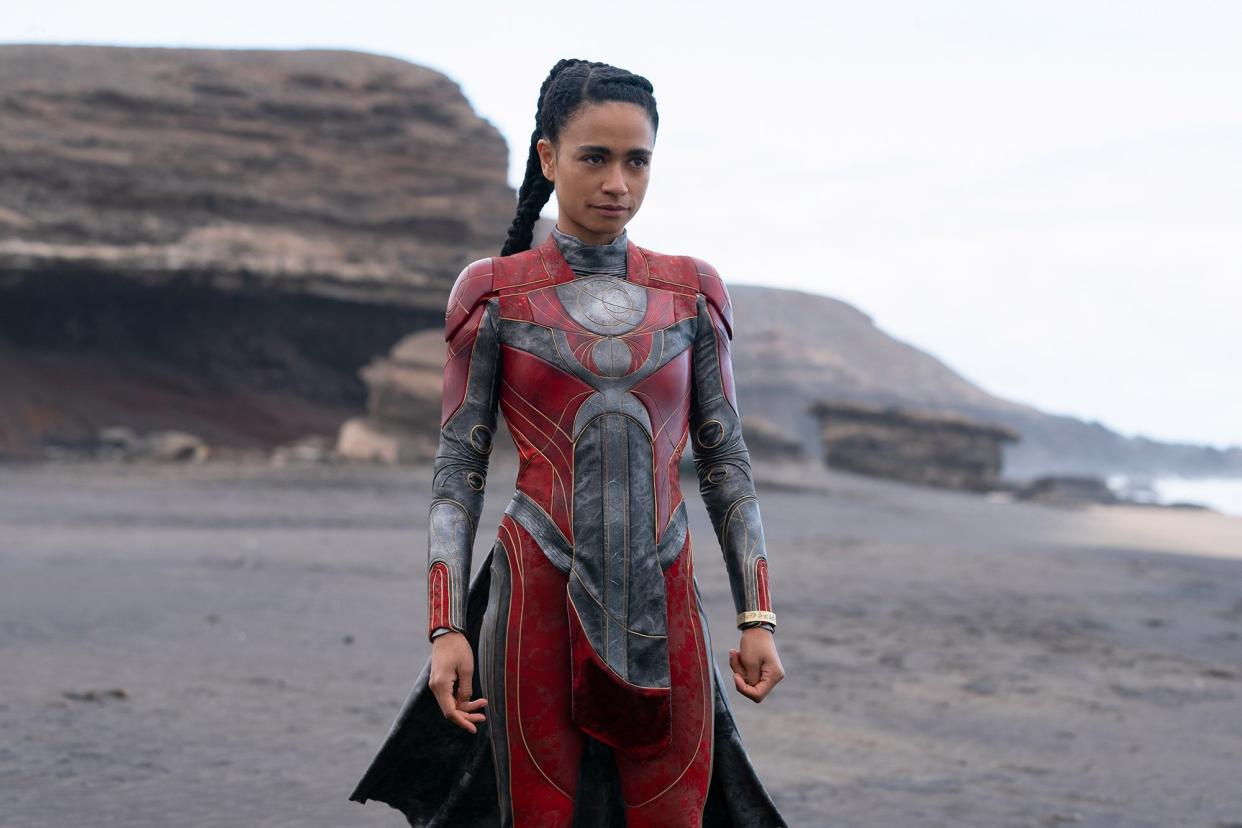Lauren Ridloff didn't think she could ask for a Black hair stylist on Eternals

- Oops!Something went wrong.Please try again later.
Despite all the progress we've seen in Hollywood of late, we still have a long way to go — and that includes making sure performers feels empowered to ask for the things they need.
While appearing on EW's Game Changers panel at San Diego Comic-Con alongside creators Julie Plec, Sierra Teller Ornelas, and Tze Chun, actress Lauren Ridloff revealed that she didn't realize she could have asked for a Black hair stylist, or someone who knew how to work with Black hair, while making the high-profile Marvel movie Eternals.
Ridloff, who is deaf and biracial, starred in the film as super-fast Makkari, the MCU's first deaf superhero. But having already required support for her accessibility needs, Ridloff didn't feel like she could ask for anything else.
"I'm still new to this industry and was joining this huge-budget film, this huge franchise, and my feeling was gratitude," she said. "I felt so lucky to be there, so lucky to occupy this space in Hollywood. I don't want to bite the hand that feeds me. I don't want to ask for too much. I feel like I already went through the trouble of having accessibility for myself, and I don't want to ask for anything else."

Sophie Mutevelian/Marvel Studios Lauren Ridloff in 'Eternals'
Ridloff added, "I loved my hair and makeup person that I had on this movie. Very sweet lady, but she didn't know how to work with my hair. She no idea how to do it. And she needed a lot of support from other people in the trailer. It took three people to do my hair. It took six hours, and I had to do my it on my day off. They had to come to my hotel room, and I had to lay on the bed so they could make it happen. It was a process, and I bared with it. I did it. I didn't say anything because I didn't know I could ask for somebody with experience with textured hair. It just didn't even occur to me."
That changed one day when she was sharing the hair and makeup trailer with another Black actor: Ridloff noticed a new person in the trailer, and her castmate said it was his barber, flown out from L.A. to cut his hair.
"I'm like, 'Wait, wait they flew somebody in? They flew your barber in?'" Ridloff recounted. "He's like, 'Yeah of course.' I was like, 'You asked for that and they did it?' 'Yeah, you should too.' I was like, 'Really? This is something you can do?' I was afraid of asking too much because I already had made specific requests because I am deaf. I thought it was too much."
It was "a wake-up moment for me," Ridloff said. "I realized that I'm investing my time. I want to deliver. I want to act. I want to do my job, and by doing my job I have to have certain things to meet my needs, as a deaf person and a biracial person, and I have this hair. It was a big wake-up call for me, and so after that, I felt so much more courageous to make these asks."
Ridloff is currently poised to star in a Starz romantic drama opposite Joshua Jackson, created by Ava DuVernay. She's also serving as a producer on the series, and said it's a major goal of hers to continue fighting for equity for deaf performers in that role.
"Deaf fans are not satisfied, they need more," Ridloff said. "We want to see more deaf people on the screen. Hollywood is a small place, and historically there's only been room for one or two deaf people. That was the mindset for so many years. And now I've been a part of these productions and I'm like, 'No, there is plenty of room for more deaf talent.' It's important to bring more people in offscreen, behind the camera. It's our responsibility to tell their stories. I know what deaf fans want is more stories that are authentic."
To that end, Ridloff is striving to bring in deaf talent throughout the creative process. "It is my goal to include many deaf people at every level," she said. "I want deaf hair-and-makeup artists. That's important to me, because I feel there are better ways to actually break those stereotypes that we are stuck with. If there are not real deaf people there, how can you create stories that are real and feel real? It's vital to me to include deaf people at every level. Will it happen? I don't know. But that is my intention. TV and film are powerful tools to shift that framework and change that framework so people will seen and represented."
Related content:

